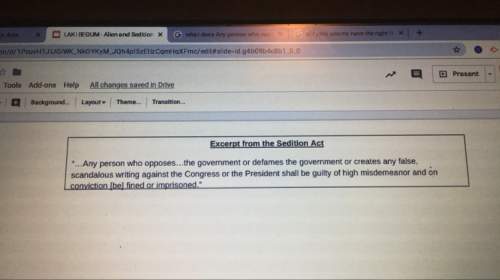
History, 16.10.2020 21:01 jayjayanyway04
It is obviously impracticable in the Federal Government of these States to secure all rights of independent sovereignty to each, and yet provide for the interest and safety of all. Individuals entering into society must give up a share of liberty to preserve the rest. The magnitude of the sacrifice must depend as well on situation and circumstance, as on the object to be obtained. It is at all times difficult to draw with precision the line between those rights which must be surrendered, and those which may be preserved; and, on the present occasion, this difficulty was increased by a difference among the several States as to their situation, extent, habits, and particular interests. In all our deliberations on this subject, we kept steadily in our view that which appears to us the greatest interest of every true American, the consolidation of our Union, in which is involved our prosperity, felicity, safety--perhaps our national existence. This important consideration, seriously and deeply impressed on our minds, led each State in the Convention to be less rigid on points of inferior magnitude than might have been otherwise expected; and thus, the Constitution which we now present is the result of a spirit of amity, and of that mutual deference and concession, which the peculiarity of our political situation rendered indispensable. —September 17, 1787 How did the members of the constitutional convention view the relationship between the states and the federal government? States must give some authority to the federal government for the good of the nation as a whole. The federal government should provide states with a greater level of sovereignty to avoid conflict. The states and the federal government must together yield to the wishes of all citizens to form a proper democracy.

Answers: 2
Another question on History

History, 21.06.2019 18:30
At the beginning of wwii, what action by winston churchill influenced hitler’s strategy?
Answers: 1

History, 21.06.2019 22:00
How does an appellate court differ from a trial court a. an appellate court usually has a jury b. an appellate court decides issues of facts c. an appellate court examines more witnesses d. an appellate court reviews another courts decision
Answers: 2

History, 22.06.2019 00:00
What happened as the result of a conflict between british troops and a colonial militia in massachusetts
Answers: 2

History, 22.06.2019 04:00
This map is depicting the 16th century route of what explorer
Answers: 1
You know the right answer?
It is obviously impracticable in the Federal Government of these States to secure all rights of inde...
Questions

Mathematics, 01.04.2021 22:10



Social Studies, 01.04.2021 22:10



Mathematics, 01.04.2021 22:10

Computers and Technology, 01.04.2021 22:10

Arts, 01.04.2021 22:10

Mathematics, 01.04.2021 22:10

Physics, 01.04.2021 22:10

Mathematics, 01.04.2021 22:10






Mathematics, 01.04.2021 22:10


Mathematics, 01.04.2021 22:10




